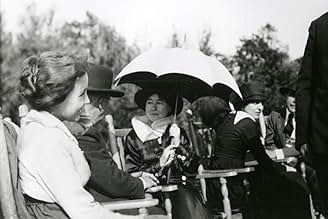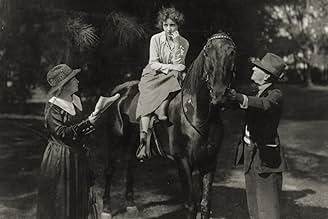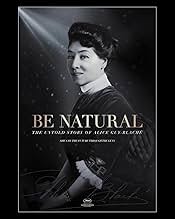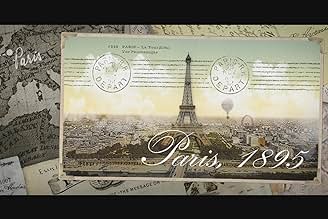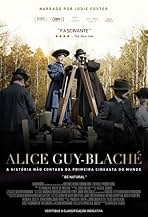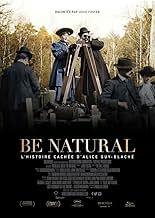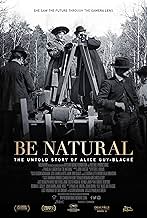Be Natural - Sei du selbst: Die Filmpionierin Alice Guy-Blaché
Originaltitel: Be Natural: The Untold Story of Alice Guy-Blaché
IMDb-BEWERTUNG
7,7/10
1214
IHRE BEWERTUNG
Es ist eine Hommage an Alice Guy-Blaché und eine Detektivgeschichte, die die Umstände nachzeichnet, durch die diese außergewöhnliche Künstlerin in Vergessenheit geriet, und den Weg zu ihrer ... Alles lesenEs ist eine Hommage an Alice Guy-Blaché und eine Detektivgeschichte, die die Umstände nachzeichnet, durch die diese außergewöhnliche Künstlerin in Vergessenheit geriet, und den Weg zu ihrer Wiederentdeckung.Es ist eine Hommage an Alice Guy-Blaché und eine Detektivgeschichte, die die Umstände nachzeichnet, durch die diese außergewöhnliche Künstlerin in Vergessenheit geriet, und den Weg zu ihrer Wiederentdeckung.
- Regie
- Drehbuch
- Hauptbesetzung
- Auszeichnungen
- 11 Gewinne & 11 Nominierungen insgesamt
Jodie Foster
- Narrator
- (Synchronisation)
Jon M. Chu
- Self
- (as Jon Chu)
Empfohlene Bewertungen
In "Be Natural: The Untold Story of Alice Guy-Blaché," Jodi Foster narrates Pamela B. Green's engaging, fascinating, informative, 103-minute documentary that focuses on the remarkable, obscure career of pioneering, Paris-born, first woman filmmaker Alice Guy-Blaché (1873-1968) who wrote, directed, and/or produced more than 1,000 films many with unconventional subject matter through her film production company Solax and tells her story through candid interview snippets with the groundbreaking filmmaker in 1964, excerpts from her letters, and black-and-white film clips and photographs and includes insightful interviews with filmmakers (such as Ava DuVernay, Catherine Hardwicke, Diablo Cody, Patricia Riggen, Tacita Dean, Julie Taymor, John Chu, Ann Fletcher, Liz Goldwyn, Cari Beauchamp, Cecile Starr, Anne Fontaine, Mark Romanek, Peter Farrelly, Floria Sigismondi, Kevin Macdonald, Maxine Haleff, Patty Jenkins, Michel Hazanavicius, Marjane Satpari, and Gary Mairs), actors (such as Sir Ben Kingsley, Julie Delpy, Evan Rachel Wood, Geena Davis, Lake Bell, Andy Samberg, Janeane Garofolo, and Kathleen Turner), producers Marc Abraham and Stephanie Dillain, Co-President of Roadside Attractions Howard Cohen, screenwriter Gale Ann Hurd, film critic Peter Bogdanovich, historians (such as Mark Wanamaker, Anthony Slide, Kevin Brownlow, Glenn Myrent, Alison McMahon, Naum 'Kleiman, and Alan Williams), Guy-Blaché memoirs co-editor Claire Clouzet, film preservationist Serge Bromberg, professors (such as Drake Stutesman, Jane Goenes, Henry Jenkins, Gigi Pritzker, Richard Koszaeski, and Vanessa Schwartz), journalist Jean-Michel Frodon, film editor Walter Murch, film archivist Dino Everett, facial recognition analyst Steve Wilkins, costume designer Deborah Nadvolman Landis, lecturer Roland-Francois Lick, cinematographers (such as Pierre-William Glenn, Claire Wickell, and John Bailey), film collector Murray Glass, visual effects supervisor Mark Stetson, Academy of Motion Picture Arts and Sciences President John Bailey, and granddaughter Tatiana Page-Relo.
Greetings again from the darkness. History can easily be distorted by those who tell it. But the work and deeds of those who make history stands the test of time, and research can often right a wrong ... or at least provide credit where it's due. Such is the case with Pamela B Greene's project to uncover the truth, and finally give pioneer filmmaker Alice Guy-Blache her rightful place in the history of cinema.
Numerous familiar faces from the movie industry flash across the screen, and most admit they have never heard of Alice Guy-Blache. Even the few that recognize the name, don't know her story. This is how the movie starts ... letting off the hook those of us who pride ourselves on knowing the basics of cinema's origins. In 1895, the Lumiere Brothers presented the first short films on their newly developed Cinematographe. In the audience that day were Leon Gaumont and his assistant, Alice Guy.
Young Ms. Guy had a creative vision for this fascinating new technology. Rather than filming "real life", she would tell stories. And telling stories through moving pictures is exactly what she did more than 1000 times across two decades and two countries. In 1896, she directed THE CABBAGE FAIRY, one of the first narrative films ... and it was only the beginning for her. Director Greene explains that so many of those early films are lost, despite being described as sophisticated, emotional, and engaging works. As she moved from France to the United States (New Jersey), Alice founded Solax with her husband, and began experimenting with sound, special effects, gender roles, and story structure.
It's truly fascinating to see the clips from many of her films, along with snippets from interviews she sat for in 1964 (before passing away in 1968). Director Greene also includes interviews from Alice's daughter Simone, while I believe are from the 1980's. Simone is able to fill in some of the gaps in the historical timeline ... a timeline that includes many familiar names. It's also a timeline that results in an abrupt end to Alice's filmmaking when she relocates back to France after the war.
How did Alice Guy-Blache get lost in history? She was a contemporary of Melies, Lumiere and the Pathe brothers. She was not just the first woman director, she was also one of the first film directors, period. Though the search continues for many of her films, Oscar winning actress Jodie Foster narrates the mission of filmmaker Pamela B Greene to right a wrong ... Alice must no longer be forgotten by the industry she helped create.
Numerous familiar faces from the movie industry flash across the screen, and most admit they have never heard of Alice Guy-Blache. Even the few that recognize the name, don't know her story. This is how the movie starts ... letting off the hook those of us who pride ourselves on knowing the basics of cinema's origins. In 1895, the Lumiere Brothers presented the first short films on their newly developed Cinematographe. In the audience that day were Leon Gaumont and his assistant, Alice Guy.
Young Ms. Guy had a creative vision for this fascinating new technology. Rather than filming "real life", she would tell stories. And telling stories through moving pictures is exactly what she did more than 1000 times across two decades and two countries. In 1896, she directed THE CABBAGE FAIRY, one of the first narrative films ... and it was only the beginning for her. Director Greene explains that so many of those early films are lost, despite being described as sophisticated, emotional, and engaging works. As she moved from France to the United States (New Jersey), Alice founded Solax with her husband, and began experimenting with sound, special effects, gender roles, and story structure.
It's truly fascinating to see the clips from many of her films, along with snippets from interviews she sat for in 1964 (before passing away in 1968). Director Greene also includes interviews from Alice's daughter Simone, while I believe are from the 1980's. Simone is able to fill in some of the gaps in the historical timeline ... a timeline that includes many familiar names. It's also a timeline that results in an abrupt end to Alice's filmmaking when she relocates back to France after the war.
How did Alice Guy-Blache get lost in history? She was a contemporary of Melies, Lumiere and the Pathe brothers. She was not just the first woman director, she was also one of the first film directors, period. Though the search continues for many of her films, Oscar winning actress Jodie Foster narrates the mission of filmmaker Pamela B Greene to right a wrong ... Alice must no longer be forgotten by the industry she helped create.
I went to see this film following a strong review in Melbourne (Australia). However, I thought that it was very poorly assembled as a film. It seemed that the film's makers were keen to include absolutely everything they could find, and the choice of order for all these clips was baffling as well as non-stop. I will be the first in the queue to see another film made to cover the astonishing life of Alice Guy-Blache - she deserves better than this attempt.
Just an amazing documentary with hilarious and wonderful surprises all through it. Amazing research and use of archival film. There is one point where they show a walking tour of the film locations in Paris from Alice Guy-Blache's films and superimpose the 100+ year old films over the streets in modern day. Never seen that effect used quite that way. It shows the documentarians share their subject's inventiveness. All the interviews with the film academic community, the film archivist community, as well as working directors and actors really paint a picture of a true pioneer. This woman was there at the very beginning, inventing the art form and the business model. A real history lesson as well, as it takes you through the industry's changes as the world went through two World Wars. You forget that it is Jodie Foster narrating because the subject is so interesting. A real labor of love, I can tell a lot of people gave their time to remembering Alice Guy-Blache.
I watched that film during the BFI film festival and the director Pamela B Green graced us with a Q&A at the end. This documentary is a formidable labour of love, extraordinarily documented and thorough, on the life and career of the first film director who ... happened to be a woman! Alice Guy-Bache! Terrific documentary, although it was so fast-paced that I felt dizzy at times! A must watch!
Wusstest du schon
- WissenswertesOriginal written source: "Alice Guy Blaché: Lost Visionary of the Cinema", book by Alison McMahan, Bloomsbury Publishing, London, 2002, 408 p., ISBN: 978-0826451576.
- Zitate
Bob Channing: If it wasn't for people like you, she'd just remain buried.
- VerbindungenFeatures Dickson Experimental Sound Film (1894)
Top-Auswahl
Melde dich zum Bewerten an und greife auf die Watchlist für personalisierte Empfehlungen zu.
- How long is Be Natural: The Untold Story of Alice Guy-Blaché?Powered by Alexa
Details
- Erscheinungsdatum
- Herkunftsland
- Offizielle Standorte
- Sprachen
- Auch bekannt als
- Be Natural: The Untold Story of Alice Guy-Blaché
- Drehorte
- Produktionsfirmen
- Weitere beteiligte Unternehmen bei IMDbPro anzeigen
Box Office
- Bruttoertrag in den USA und Kanada
- 117.511 $
- Eröffnungswochenende in den USA und in Kanada
- 3.237 $
- 21. Apr. 2019
- Weltweiter Bruttoertrag
- 210.247 $
- Laufzeit
- 1 Std. 43 Min.(103 min)
- Farbe
Zu dieser Seite beitragen
Bearbeitung vorschlagen oder fehlenden Inhalt hinzufügen



